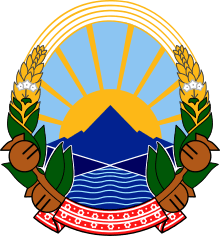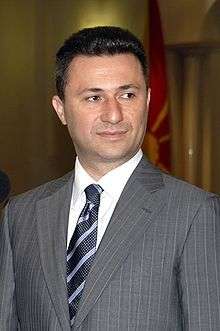Macedonian parliamentary election, 2016
| | |||||||||||||||||||||||||||||||||||||||||||||||||||
| |||||||||||||||||||||||||||||||||||||||||||||||||||
| |||||||||||||||||||||||||||||||||||||||||||||||||||
| |||||||||||||||||||||||||||||||||||||||||||||||||||
 |
| This article is part of a series on the politics and government of the Republic of Macedonia |
|
Early parliamentary elections will be held in Macedonia on 11 December 2016,[1] having originally been planned for 24 April and later 5 June.[2]
Background
The elections were called as part of an agreement brokered by the European Union to end the protests against the government of Nikola Gruevski.[3] From 20 October 2015, a transitional government was installed including the two main parties, VMRO-DPMNE and the Social Democratic Union (SDSM). A new special prosecutor was appointed to investigate Prime Minister Nikola Gruevski and government ministers. According to the Przino Agreement signed in mid-December 2015, Gruevski will be required to resign as Prime Minister 120 days before the elections.
Assembly speaker Trajko Veljanovski confirmed the date on 18 October.[1]
Electoral system
Of the 123 seats in the Assembly of the Republic, 120 are elected from six 20-seat constituencies in Macedonia using closed list proportional representation, with seats allocated using the d'Hondt method. The remaining three seats are single-member constituencies elected by first-past-the-post representing Macedonians living abroad, with one for Europe and Africa, one for the Americas and one for Asia and Australia.[4]
References
- 1 2 Macedonia sets December 11 for snap elections Press TV, 18 October 2016
- ↑ Statement by Commissioner Hahn and MEPs Vajgl, Howitt and Kukan: Agreement in Skopje to overcome political crisis European Commission, 15 July 2015
- ↑ Macedonia unrest: EU brokers plan for early elections BBC News, 2 June 2015
- ↑ Electoral system IPU



